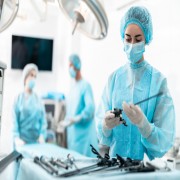Keyhole surgery is the new normal for colon cancer
Advancing technology means patients have less trauma and can recover more quickly

Before the advent of all the tremendous technological advancements surgeons have at their disposal today, most operations on the colon and rectum had to be done the traditional way. This approach, called open surgery, required surgeons to make large incisions on the abdomen and/or pelvis area that may lead to a lengthy recovery period. However, current techniques and instruments allow surgeons to perform the same procedures using only several small incisions; this approach is also known as “minimally invasive” or “laparoscopic” colorectal surgery.
Minimally invasive or laparoscopic surgery involves several thin tubes - also called trocars - placed through three to five small incisions that are usually less than 0.5 cm in size. Afterwards, carbon dioxide gas is used to steadily inflate the abdomen before a laparoscope - a thin, hollow tube with a video attached to the end - is inserted through one of the trocars, allowing the surgical team to view the inside of the abdomen on a TV monitor. This procedure is performed under general anaesthesia, which means the patient will be completely asleep during the process.
Keyhole surgery, another way to refer to laparoscopic operations, has quickly become the norm and should be the standard of care for surgery in colorectal cancer, according to Dr Dennis Koh, a colorectal surgeon at Mount Elizabeth Hospital in Singapore.
“Maybe if you look five or 10 years back, many of the colorectal surgery societies still recommended open surgery. But nowadays the gold standard for it is keyhole surgery,” he said.
“I would say less than 10 percent of my cases involve open surgery.”
With smaller surgical wounds, keyhole surgery causes less trauma and helps the patient recover more quickly. Though he tells them to expect to spend a week in the hospital after surgery, in fact most go home within three to five days. By contrast, patients who have had open surgery would expect to be warded for one to two weeks.
Most patients are suitable for minimally invasive surgery, unless they have had previous operations in the same area. However, a well-trained laparoscopic surgeon will still be able to perform such cases laparoscopically.
“Most, if not all, patients are suited to undergo laparoscopic surgery,” said Dr Koh. “Unlike the past, even patients who had previous open abdominal surgeries can still undergo laparoscopic surgeries in the hands of well-trained surgeons.”
“Minimally invasive colorectal surgery has been used commonly over the recent years for their advantages over conventional surgery,” says Dr Koh. The advantages include:
- Since the procedure involves only small incisions, the patient will experience less postoperative discomfort
- The patient can also expect less pain when the procedure is done and a reduced risk of infection
- It won’t take long before the patients can go back to their usual diet and activities
- Better cosmetic healing (e.g. smaller and less obvious scars)
Why is the surgery necessary?
If you are suffering from colorectal diseases or conditions such as colon cancer, diverticulitis, and polyps, your surgeon may recommend you undergo laparoscopic colorectal surgery.
The following symptoms may suggest that you suffer from colorectal diseases:
- Bleeding from the rectum
- Abdominal pain
- Change in bowel habits
- Weight loss
- Anaemia
Once you experience these symptoms, it is a must that you consult your doctor right away to avoid further complications.
Dr Dennis Koh is a colorectal surgeon at Mount Elizabeth Hospital in Singapore. His special interests are in proctology and colorectal surgery, especially with the use of keyhole or minimally invasive surgery techniques.
Related Articles
Why do patients see a gastroenterologist?
Dr Tan Chi Chiu discusses the gastrointestinal symptoms patients usually present with
Read moreWhy do patients develop reflux?
Dr Tan Chi Chiu looks at the symptoms and causes of gastroesophageal reflux disease
Read moreWhat you need to know about heartburn
Professor Benjamin C.Y Wong answers some common questions on heartburn
Read moreLatest Articles
Medical Care
Clinical Exercise Physiologist (CEP): The Emerging of Exercise is Medicine
How Exercising can be a Medicine
Read moreMedical Care
Reversing type 2 Diabetes: Embracing Hope and Determination
Experience the remarkable journey of Ash and his grandfather Atok as they conquer type 2 diabetes through unconventional methods, showcasing the power of love and determination over adversity.
Read moreMedical Care
Bladder Cancer: What You Need to Know
Empower yourself with our comprehensive guide to bladder cancer. Explore symptoms, diagnosis, treatments, and supportive resources to safeguard your health.
Read more